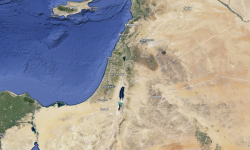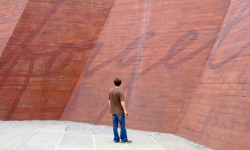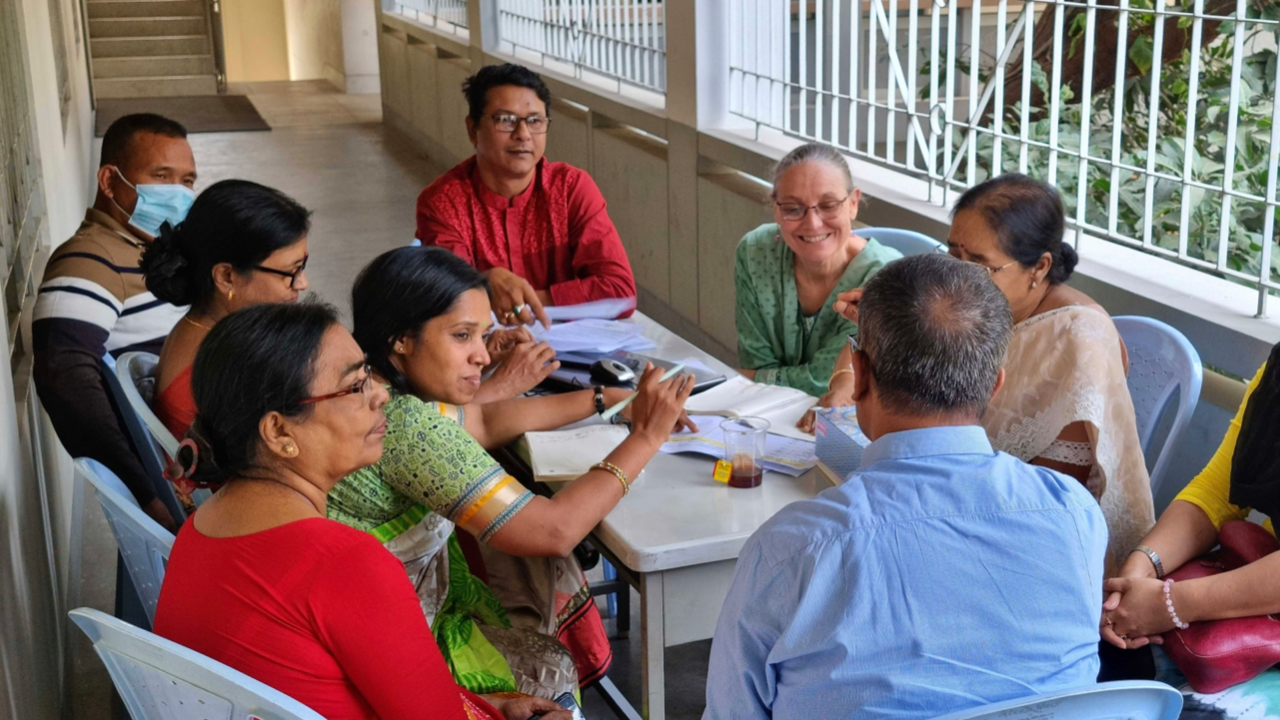
In this article, Julian Doorey challenges Baptist churches to move beyond their boundaries and become part of national Baptist church strategies. He shares about leading/facilitating the Bangladesh Baptist churches’ five-year country-wide strategic planning work in 2022-23. Julian and his family served in Bangladesh with Arotahi (NZBMS) for 13 years, returning to New Zealand in 2015.
All nations
Making disciples of all nations…it’s not often we have a hands-on opportunity to influence another country’s Christian movement while sitting in New Zealand (St Kilda, Dunedin). The Bangladesh Baptist Church Fellowship (BBCF) offered exactly this opportunity, inviting me to lead (I prefer facilitate) their five-year national strategic planning exercise…a somewhat daunting exercise. BBCF is a church union of 319 active churches grouped in 18 District Fellowships. It also includes 10 Service Wings (boards, committees, departments), including Aid & Development, Mission & Evangelism, Finance, Hostels, Medical, Men, Scholarships, Schools, Women and Youth. I worked with the BBCF via email and Zoom part-time for 15 months based in Dunedin, with a 1-month trip to Dhaka in November 2022.
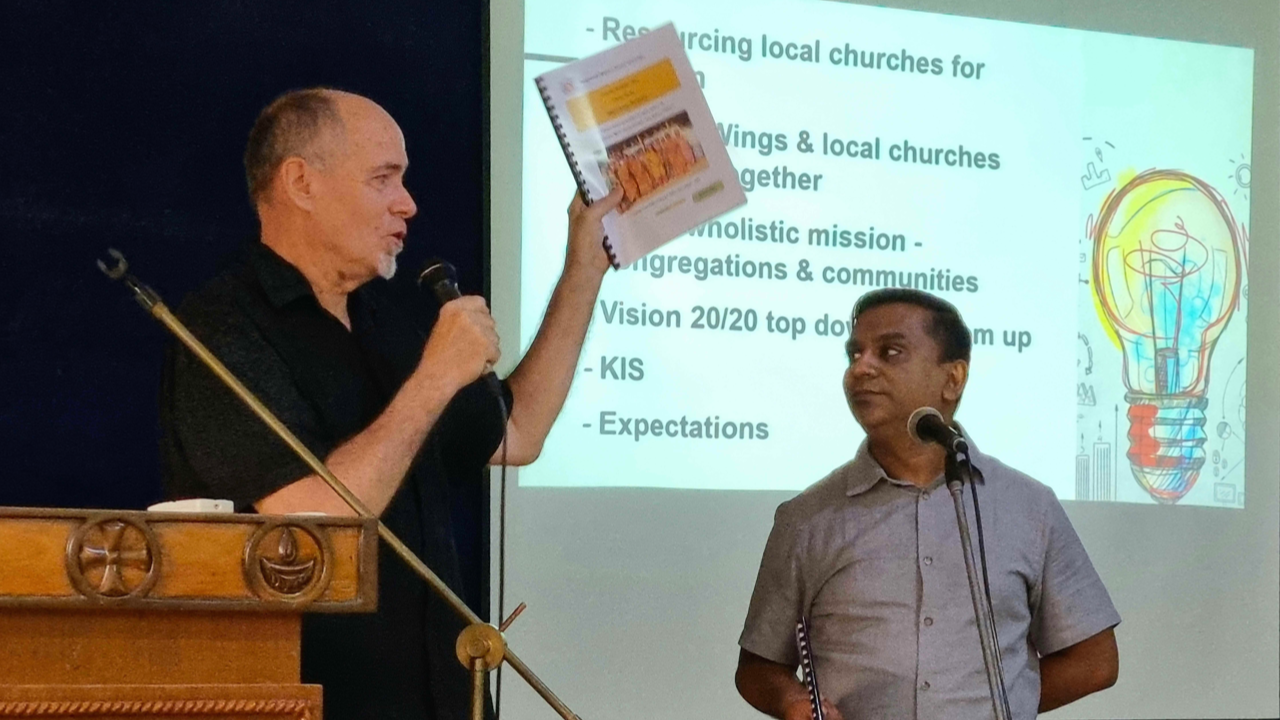
Previous strategic plan (out it goes)
Baptist elephants
We know the Baptist elephant(s) in the room… Baptist distinctives of voluntary association, local autonomy and lack of national organisational authority. While beneficial for local initiatives, they make national collective strategies almost impossible. However, social science tells us that groups that work well together outperform those that don’t – self-evident in families, workplaces, sports teams and churches. We Baptists don’t always seem convinced of the larger collective benefit gained by churches working together. Social science also tells us that individual group members who altruistically/sacrificially contribute to their group’s overall success do not automatically benefit themselves. And there lies the rub…as culture (Baptist) eats strategy for breakfast. Is your church willing to contribute to the greater good of the Baptist movement, with no guarantee of your local church directly benefitting?
Ground rules
Working nationally within Baptist cultural constraints, which are just as strong in Bangladesh as in New Zealand, required some agreed ground rules even to get started. These included:
> Strategic planning is defined as: ‘Assisting a group of people (churches and service wings) to work together in an agreed and known way towards a common goal’ – not too complicated.
> People, planning and prayer: These three words guided us. Good planning will achieve nothing without committed people and prayer. Equally, people or prayer alone will achieve little. People invited to participate towards their collective future through planning and prayer feel valued and empowered. Ownership is critical for members, churches (small and large) and service wings to want to be involved.
> BBCF is everyone: BBCF is not the Dhaka Service Centre (BBCF office) but includes all members, local churches and service wings. The Dhaka Service Centre and service wings exist to resource local churches for mission in their communities.
> Top-down facilitation and bottom-up initiatives: Top-down enforcement doesn’t work – that’s failed before. The planning process facilitated local churches via district fellowships and service wings to produce their own strategic plans, then combined them into a whole. This works but takes time.
> Working together and independently: The district fellowships and service wings sometimes work independently and sometimes together to support the wider BBCF goals. Flexibility is key.
> Shared mission understanding and language: BBCF had previously adopted a holistic mission for their context of huge spiritual and physical needs. The new strategic plan focused on supporting district fellowships and service wings to design goals and activities that both (1) strengthen church congregations and (2) support local communities.
> Simple, realistic and achievable: District fellowships and services wings were limited to three goals each to strengthen church congregations and another three goals to support local communities.
Planning process
Planning steps make a huge and complicated task more doable. Each step involved BBCF members, staff and leaders (from churches, district fellowships, and service wings) providing survey and planning data (numbers & narrative) using templates (survey & design forms). This involved several orientations, workshops, presentations and feedback. The steps were:
Step 1: Church Congregations – Stats, Activities & Development Context survey
Step 2: Church District Fellowships – SWOT & Goals
Step 3: Church District Fellowships – Strategic Plan / Action Plan
Step 4: Service Wings – Basic Operational Information
Step 5: Service Wings – SWOT & Goals
Step 6: Service Wings – Strategic Plan / Action Plan
Step 7: Service Wings – Organisational Capacity Self-Assessment & Improvement Plans
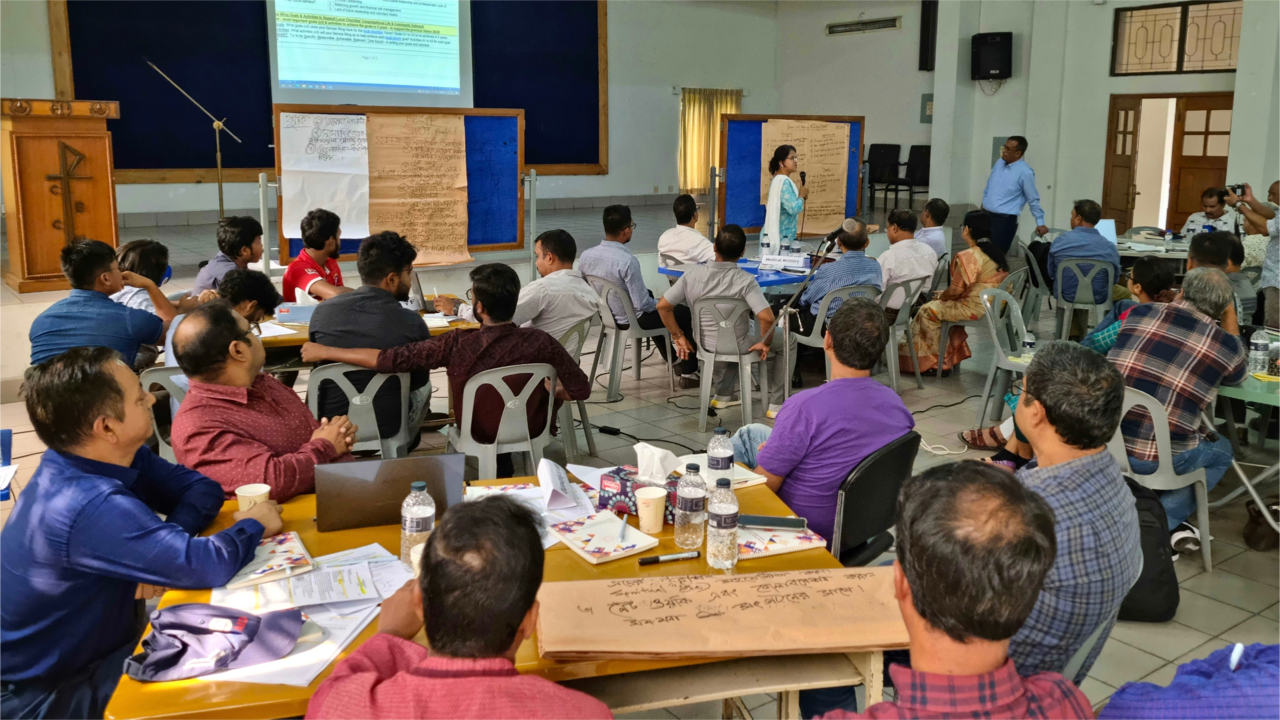
Medical Ministry presentation (super organised)
Current situation
Before planning a future, we assess the current situation. A few survey findings relating to BBCF churches…
Q1: Churches. 319 active churches. A number of inactive churches.
Q2: Local church members & their families. Children 0-12 (3837, 22%), Youth 13-30 (5302, 30%), Adults 31+ (8456, 48%), Total 17,595.
Q3: Local church members education. Year 10~11 avg.
Q4: Church members household income. $NZ 140 per month / $NZ 40 per week / $NZ 6 per day avg.
Q5: Churches with 1 or more pastors (paid & unpaid). 287 churches (90%).
Q6: Pastors work time. Part-time 120 (39%), Full-time 188 (61%), Total 308 pastors.
Q7: Pastors pay. No pay 220 (71%), Part-pay 57 (19%), Full-pay 31 (10%).
Q8: Pastors general education. Year 11~12 avg.
Q9: Pastors Christian training. 1 or 2 month basic discipleship at Year 11 level avg.
Q10: Church income. $NZ 350 per year avg.
Q11: Church income offerings as % of local members income. 1.4% avg.
Q12: Churches running activities. Children activities 40% of churches. Youth activities 20%.
The Bangladesh Baptist churches’ country context is very different from New Zealand’s, particularly regarding income and education. An average church household income of $NZ 40 per week ($NZ 6 per day) reflects poverty. Flow-on effects are that 71% of pastors aren’t paid, and 19% are part-paid. The average church income of $NZ 350 per year doesn’t go far. Church members give an average of 1.4% of their income. Related to poverty is the lack of good educational opportunities. An average local church member is educated to about year 10 or 11, while pastors are just ahead at year 11 or 12. Pastors’ Christian training, on average, is one or two months of basic discipleship at year 11 or 12 level. New Zealand Baptist church members and pastors are light years ahead in income, education and facilities. BBCF can teach us much about achieving God’s purposes with very few resources. As a result of poverty, the survey questions included very different topics to a New Zealand survey, for example, (1) Basic physical needs experienced: clean air, water, food, clothing, shelter, cooking fuel/energy, and (2) Access to and affordability of education, medical care, toilets, clean water etc.
Future activities
The planning process enabled local churches via district fellowships and service wings to design their own goals and activities to implement over five years. The activity plans included a standard set of questions, including goals, recipient/beneficiary details, activities and targets, implementation parties, activity inputs – tasks, people, equipment/material & time, budgets and possible income sources. The resulting 152 strategic goals and supporting activities set out to achieve BBCF’s wholistic mission, to both (1) Strengthen church congregations (84 goals) and (2) Support local communities (68 goals). Most goals include two or three activities. A number of common generic activity categories were chosen to assist with planning and reporting. The frequency of each activity is shown in the list and graph below. A few activities fit two or more activity categories - for example, Pastor training fits both #1 & #2.
Strengthen Church Congregations
Primary focus is growth in discipleship, congregational involvement and outreach. The recipients are primarily Christians and churches (84 goals).
#1 Pastor Activities & Appointment. Frequency: 20 | 10% Activity examples: Appoint 42 pastors. Train 238 pastors. Free health check-ups for 375 pastors.
#2 Theological & Ministry Training. Frequency: 20 | 10% Activity examples: Train 238 pastors. Train 37 other people.
#3 Outreach & Church P. (redacted). Frequency: 28 | 14%
#4 Church Life & Bible Teaching. Frequency: 35 | 17% Activity examples: Bible discipleship in 70 churches. Prayer groups in 36 churches. Revival meetings in 52 churches. Teach church and community transformation in 40 churches.
#5 Children & Youth Groups. Frequency: 31 | 15% Activity examples: Train 68 Sunday School teachers. Start 104 Sunday Schools. Run 21 child camps. Train 156 youth leaders. Start 89 youth groups. Run 15 youth camps.
#6 Men & Women Groups. Frequency: 20 | 10% Activity examples: Start 30 men fellowships. Run 3 men camps. Train 10 women leaders. Start 59 women fellowships. Run 10 women camps. (redacted)
#7 Church Income & Personal Giving. Frequency 44 | 21% Activity examples: Teach tithes and giving in 160 churches. Fund raising training in 108 churches. Prep tithes and giving resources for all 319 churches. Create employment in 18 churches.
#8 Land, Buildings & Facilities. Frequency 9 | 4% Activity examples: Arrange 25 church buildings, 5 cemeteries and 2 conference centre / Bible schools with land. Repair 10 church buildings.
Support Local Communities (& Local Churches) in developmental way
Primary focus is poverty alleviating development for the wider community. The recipients are primarily non-Christians in the wider community, however local churches are also part of the wider context. (68 goals)
#1 Education & Literacy. Frequency 19 | 15% Activity examples: Arrange 9 pre-schools 700 children. Financially assist 400 families. Provide school materials for 500 children. Build 1 new school. 12 student scholarships.
#2 Economic Development & Livelihoods. Frequency 18 | 14% Activity examples: Run savings and loans groups in 62 communities. Run income training in 85 communities. Provide financial assistance in 18 communities.
#3 Primary healthcare. Frequency 31 | 25% Activity examples: Run healthcare education (pregnancy, maternal mortality, food and nutrition, lightning safety etc) in 63 communities. Provide affordable healthcare for 370,000 people. Arrange 30 toilets and 30 clean tube well water supplies.
#4 Human Rights & Gender Equality. Frequency 30 | 24% Activity examples: Social awareness (women’s rights, gender equality, children rights, domestic violence, child marriage, child labour, dowry etc) in 175 communities.
#5 Environmental Care. Frequency 13 | 10% Activity examples: Arrange tree saplings for 91 communities. Run 5 church and 5 school rubbish removal teams. Run environmental awards in 5 schools.
#6 Disaster risk reduction. Frequency 15 | 12% Activity examples: Provide disaster prep training and response teams in 42 communities. Arrange lightning safety education in 24 communities. Provide disaster shelter in 30 churches.
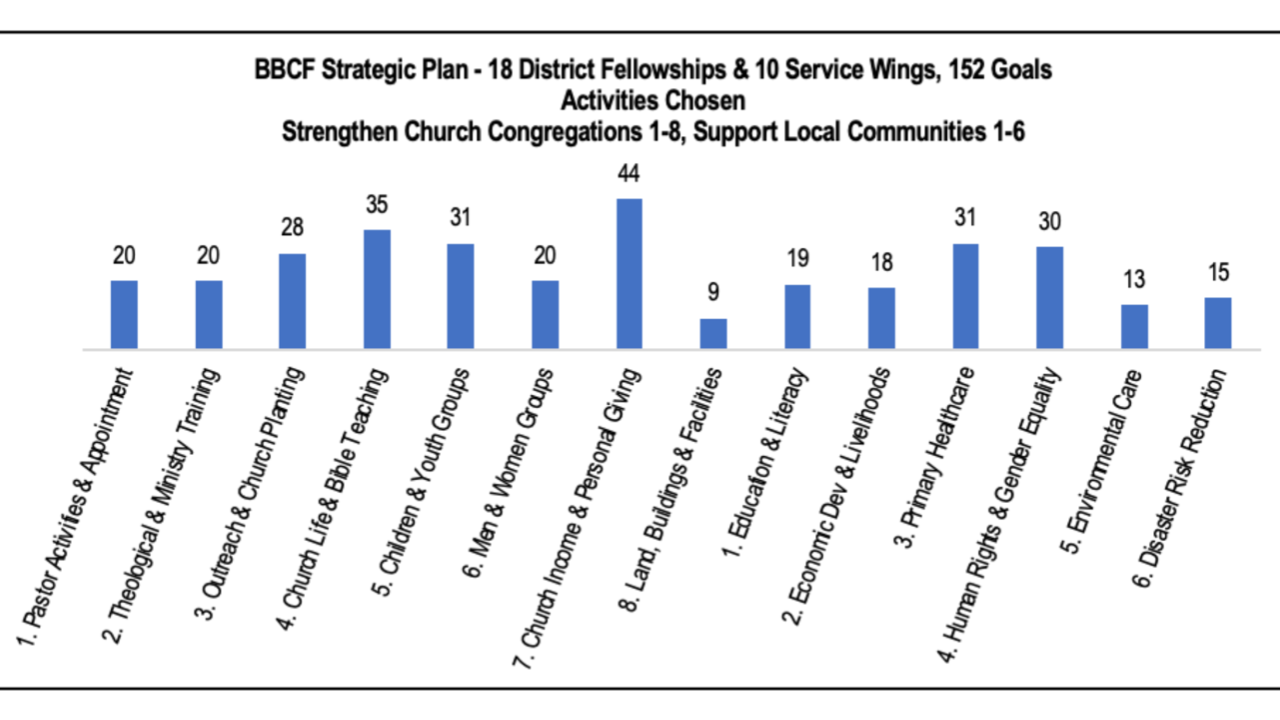
Zoom in function only on website version:
Final reflection
How do we NZ Baptists organise ourselves to join God’s work? Often, we self-describe ourselves as a ‘movement’ of churches, with an underlying concern that we don’t want to become ‘machinery’ or, even worse, a ‘monument’. We like the idea of being somehow radical non-conformists (historically…these days?), perhaps with a hint of anti-establishment and suspicion of institutions. We want to be people of the Spirit. I’ve often heard, or it’s been implied, that God’s Spirit needs freedom to work, and perhaps organisational planning may somehow hinder the Spirit’s work. I’m not sure of the biblical basis for this, but Jesus says to plan well (Luke 14:28-30): “Suppose one of you wants to build a tower. Won’t you first sit down and estimate the cost to see if you have enough money to complete it? For if you lay the foundation and are not able to finish it, everyone who sees it will ridicule you, saying, ‘This person began to build and wasn’t able to finish’.” It seems that our planning is absolutely part of God’s bigger plan. God works through people of all personality types, theologies, worship styles, prayer patterns and organisational preferences. Who says Baptists can’t plan and work together? The Bangladesh Baptists show us they can! Are our NZ Baptist churches prepared to work together - locally, regionally and nationally?
If you are interested in making disciples of all nations (or at least one), contact Arotahi, the NZ Baptist global mission, at arotahi.org.nz. If you are interested in missional strategic planning, contact Julian at [email protected].
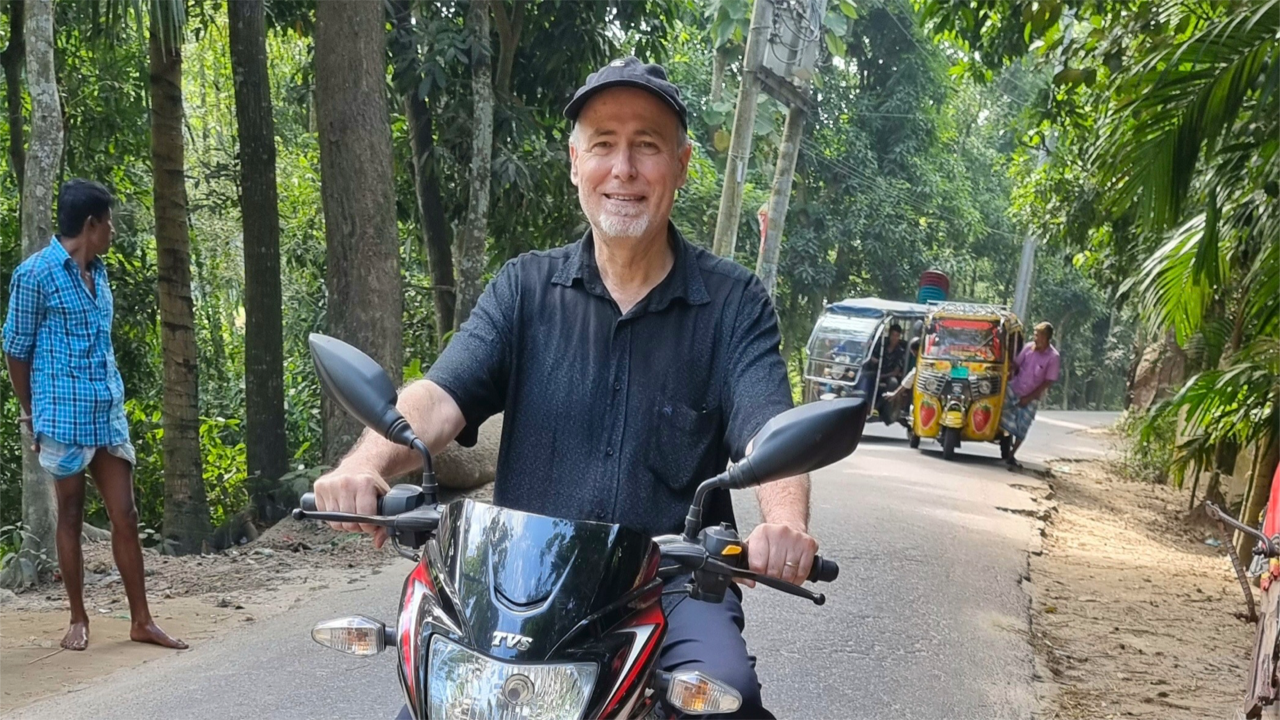
Photos supplied by Julian Doorey
Cover image: School & Education focus group (great job).
